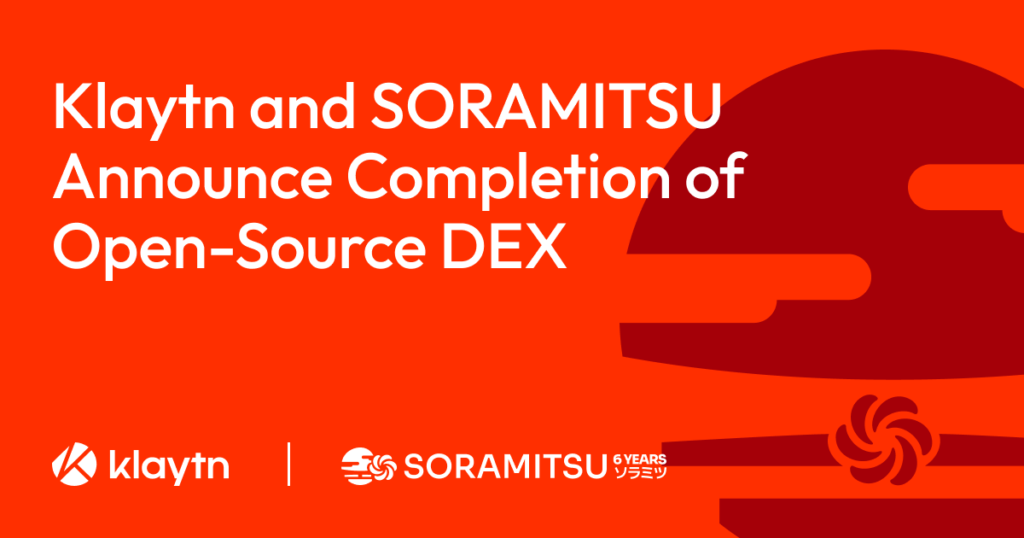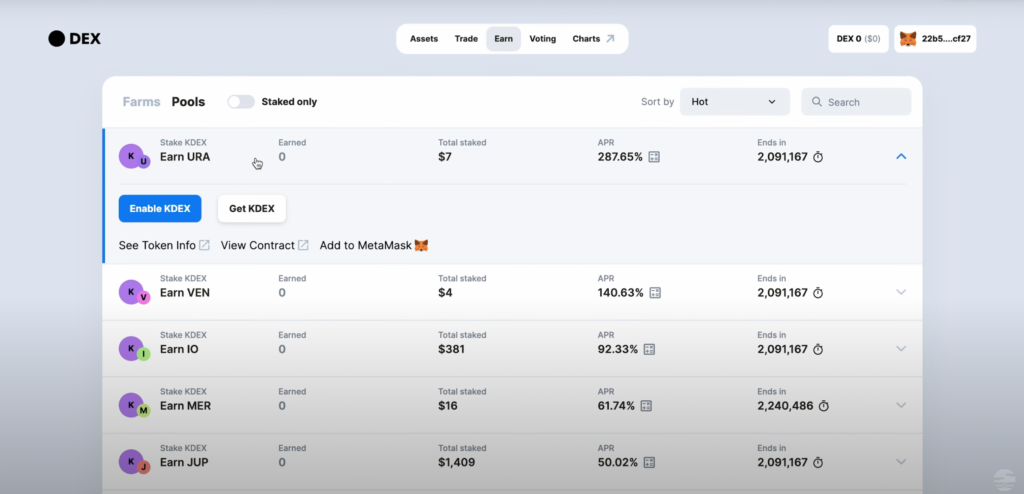Klaytn and SORAMITSU Announce Completion of Open-Source DEX

TL;DR:
- SORAMITSU has developed an open-source decentralized exchange (DEX) infrastructure for the Klaytn blockchain.
- The open-source DEX will initially have various features, from fungible token swapping and token-based governance to staking and liquidity provision and token minting.
- The DEX will be available for users to test from 29 November 2022.
Decentralized exchanges (DEXes) serve as a key pillar of a blockchain ecosystem, providing trustless access to liquidity and helping networks gain growth and traction.
With this in mind, a collaboration with SORAMITSU to build the backbone architecture and design for an open-source DEX on the Klaytn blockchain was announced in March.
After seven months of close cooperation, it is our pleasure to announce that the DEX infrastructure is complete. Proposed via the Klaytn Improvement Reserve (KIR), the open-source release will advance Klaytn’s vision of allowing more users to be part of the Web3 revolution while keeping the network at the forefront of technological developments.
The open-source DEX will initially have a range of features, from fungible token swapping and token-based governance to staking and liquidity provision as well as token minting. It will also incorporate dashboards for ease of data visualization for Klaytn network users. The DEX backbone architecture will also allow DEX operators to implement tokenomics and provide liquidity.

In the spirit of openness and transparency, the progress of the SORAMITSU-developed open-source DEX infrastructure was documented in milestones and presented to the Klaytn community through the KIR.
Sangmin Seo, Representative Director, Klaytn Foundation, said, “We are pleased with the progress made on the open-source DEX by SORAMITSU. This significant milestone serves as a testament to the new possibilities our ecosystem has for further interoperability and decentralization within the Klaytn metaverse.”
Andrew Wong, Chief Operating Officer, SORAMITSU, said, “We couldn’t be more proud to partner with the Klaytn community to advance their ongoing globalization efforts. Our common focus on building for the long term, together with our unique combination of assets, technology, and people, will enable both SORAMITSU and Klaytn to achieve our shared vision for a decentralized tomorrow.”
The SORAMITSU-developed open-source DEX infrastructure will be available for public testing from 29 November 2022 till 20 January 2023. Access the testnet here and view the user guide and testnet tutorial video for more guidance.
About SORAMITSU
SORAMITSU is a Japanese fintech company with expertise in developing blockchain-based solutions for digital asset and identity management. Our mission is to use blockchain to promote innovation and solve pressing societal challenges.
SORAMITSU is the developer of and major contributor to the open-source blockchain platform Hyperledger Iroha, which is tailored for enterprise and public-sector use. Part of the Linux Foundation’s Hyperledger Project, the Iroha blockchain’s flexible permissions system and scalable, performant architecture suit it to digital asset and identity management in high-traffic, multi-stakeholder environments.
Utilizing blockchain, SORAMITSU has developed a digital currency for the National Bank of Cambodia, a closed-loop payment system for the University of Aizu in Japan, an identity verification system prototype for Bank Central Asia in Indonesia, we were finalists in the Monetary Authority of Singapore CBDC Challenge, and are currently participating in Asia-Pacific’s first proof-of-concept test of a cross-border, multi-currency security settlement system using distributed ledger technology with the Asian Development Bank. We have also conducted proof-of-concept tests for several major Japanese enterprises, and are active contributors to open-source projects, such as the SORA cryptoeconomic system, the Polkaswap DEX, and the DeFi wallet, Fearless Wallet.
Based on these experiences, SORAMITSU aims to deploy cutting-edge technology on a global level in order to expedite financial inclusion and health, mitigate economic inefficiencies, and contribute to the fulfillment of the Sustainable Development Goals.
